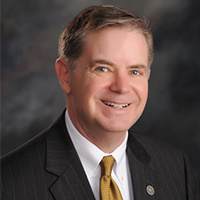Burlingame Wills & Probate Lawyer, Kansas
Includes: Estate Administration, Living Wills, Wills
Joseph P. Huerter
✓ VERIFIEDDivorce & Family Law, Criminal, Personal Injury, Car Accident, Wills & Probate
Joe is a trial lawyer. He brings his litigation skills to a variety of matters, including the representation of people injured in automobile and motor... (more)


